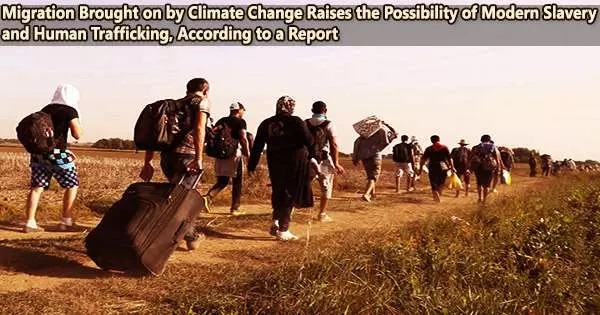Human migration is the movement of people from one place to another, typically involving a change in their place of residence. This movement can be temporary or permanent, voluntary or forced, and it has been a fundamental aspect of human history and development.
Climate-change-induced migration has been linked to the risk of human-trafficking and modern slavery, a new study from the Rights Lab at the University of Nottingham has found.
A new report from the Rights Lab, in partnership with the Catholic Agency for Overseas Development (CAFOD), Caritas Bangladesh, OKUP and Caritas India, adds important evidence to emerging literature on the critical link between climate change, migration and human trafficking.
The report focuses on the Sundarbans mangrove forest and the southwest border region between Bangladesh and India, which contains some of the most climate change-vulnerable areas in the world.
Results from the largest home research ever conducted in the area which included more than 1,200 households are included in the report, demonstrating the unbreakable link between human trafficking, migration, and climate change.
By undertaking this study on a small region, but involving over 1,200 households, we can provide nuanced data on the impacts of climate change. Focusing on concentrated areas enables our partners in-country to provide tailored support and interventions to community members.
Dr. Bethany Jackson
According to the study, over 88% of households in Bangladesh and 61% of households in India said that climate change had a negative impact on their way of life, and more than one-third of homes had moved during the previous five years. In addition to the threats to livelihoods, examples of recruiting fees and debt bondage have also been reported.
Researchers, led by Dr. Bethany Jackson from the University of Nottingham Rights Lab, found that criminal groups were also likely to use disruption caused by climate change to seek out individuals to exploit, and individuals were likely to be led into situations of illegal activity after infrastructure, such as houses, had been destroyed.
Jackson said, “The experiences of communities to climate change impacts in the Sundarbans region is becoming more acute and the impacts this is then exhibiting on those communities in terms of their livelihoods, choice to migrate, and vulnerability to human trafficking is a vital interconnected issue to explore.”
“By undertaking this study on a small region, but involving over 1,200 households, we can provide nuanced data on the impacts of climate change. Focusing on concentrated areas enables our partners in-country to provide tailored support and interventions to community members.”
“Being able to generate and deliver research alongside the partners with the support of CAFOD has been a great pleasure, and it is exciting to see the vital work that is now being undertaken in the region being underpinned by the study’s key findings on risks and access to support services.”
















